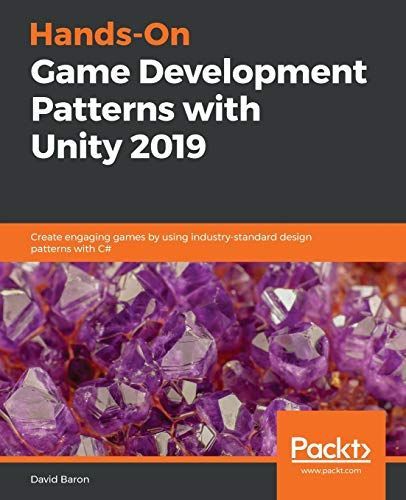
Hands-On Game Development Patterns with Unity 2019 Create engaging games by using industry-standard design patterns with C#
Write maintainable, fault-tolerant, and cleaner game codes by understanding the standard development patterns and battle-tested practices. Key Features Gain expertise in Industry Standard design patterns. Get your hands on popular patterns such as Observer, Singleton, State, and Factory. Leverage the power of C# coding to create solid architectures for your game projects. Book Description Traditional building blocks of a robust architecture, such as design patterns, cannot be applied in Unity without being adapted to the Engine's unique way of doing things. We will review design patterns that are currently used by professional game programmers in indie, mobile, and AAA studios. We will also examine the infamous anti-patterns. The book begins by explaining Unity Engine's architecture and shows you how to explore it for designing games. This will help readers get familiar with the pillars of Unity's Engine architecture and assist them in making better technical decisions. We will then learn about the game industry's most popular software design patterns. Right from the initial concept up to its implementation, you'll learn every detail in the context of genuine industry use cases that game programmers often deal with in the field. This approach will be a onestop reference point and will give you a complete picture of tried and tested software development patterns with Unity using C#. We will review classic patterns such as Singleton; modern patterns such as Event Bus; and even rare patterns such as the Spatial Partition. The book concludes by covering the dark side of design patterns, by exposing recognizable patterns that tend to creep out in code bases and have unexpected negative side-effects. What you will learn Discover the core architectural pillars of the Unity game engine. Learn about software design patterns while building gameplay systems. Acquire the skills to recognize anti-patterns and how to avoid their adverse effect in your codebase. Enrich your design vocabulary so you can better articulate your ideas on how to better your game's architecture. Gain some mastery over Unity's API by writing well-designed code. Get some game industry insider tips and tricks that will help you in your career. Who this book is for The ideal target audience for this book is game developers who want to get their hands on industry-standard, software development patterns and techniques to create engaging and exciting games with Unity 2018. Basic Unity development knowledge is necessary to make the most out of this book. Prior experience with C# will also be helpful